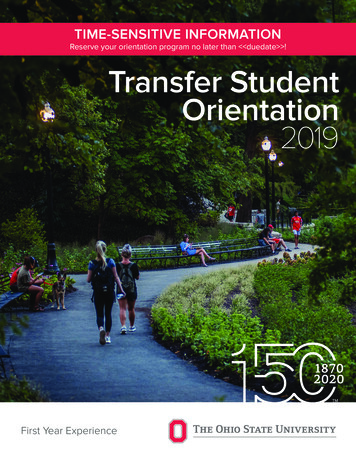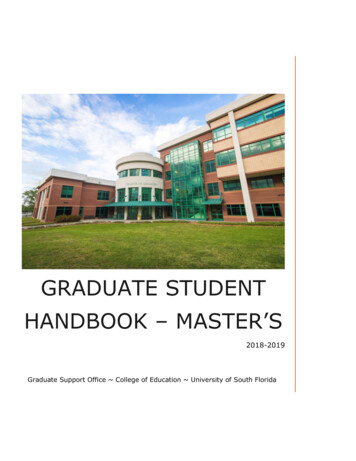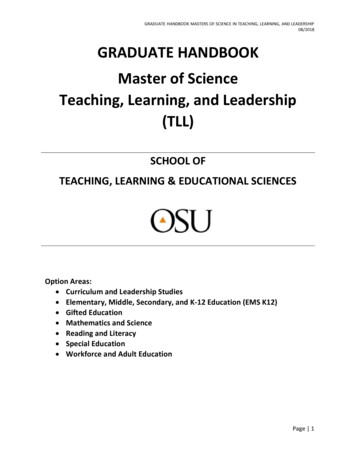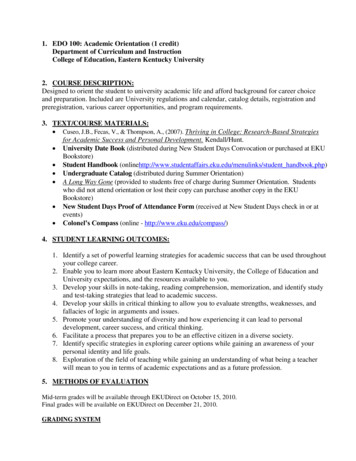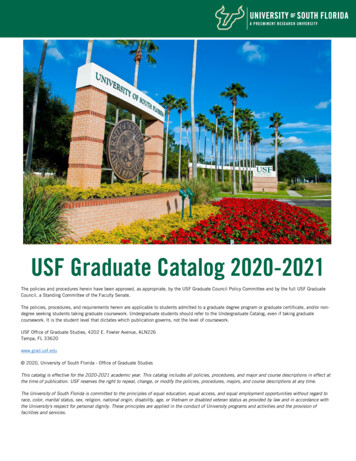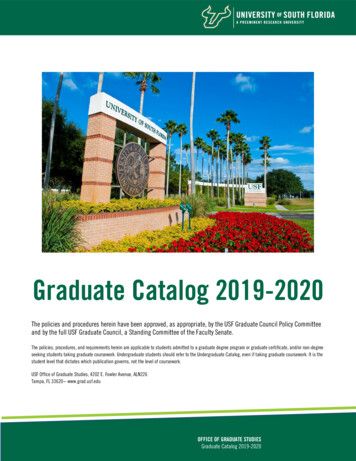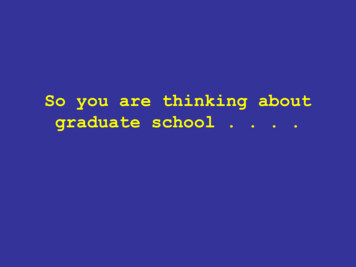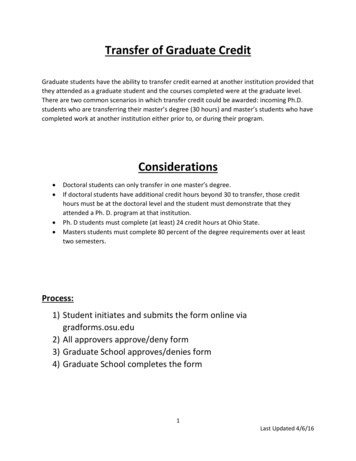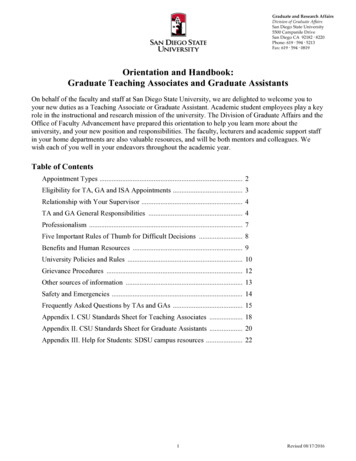
Transcription
Graduate and Research AffairsDivision of Graduate AffairsSan Diego State University5500 Campanile DriveSan Diego CA 92182 8220Phone: 619 594 5213Fax: 619 594 0819 Orientation and Handbook:Graduate Teaching Associates and Graduate AssistantsOn behalf of the faculty and staff at San Diego State University, we are delighted to welcome you toyour new duties as a Teaching Associate or Graduate Assistant. Academic student employees play a keyrole in the instructional and research mission of the university. The Division of Graduate Affairs and theOffice of Faculty Advancement have prepared this orientation to help you learn more about theuniversity, and your new position and responsibilities. The faculty, lecturers and academic support staffin your home departments are also valuable resources, and will be both mentors and colleagues. Wewish each of you well in your endeavors throughout the academic year.Table of ContentsAppointment Types . 2Eligibility for TA, GA and ISA Appointments . 3Relationship with Your Supervisor . 4TA and GA General Responsibilities . 4Professionalism . 7Five Important Rules of Thumb for Difficult Decisions . 8Benefits and Human Resources . 9University Policies and Rules . 10Grievance Procedures . 12Other sources of information . 13Safety and Emergencies . 14Frequently Asked Questions by TAs and GAs . 15Appendix I. CSU Standards Sheet for Teaching Associates . 18Appendix II. CSU Standards Sheet for Graduate Assistants . 20Appendix III. Help for Students: SDSU campus resources . 221Revised 08/17/2016
TA/GA OrientationGraduate Affairs, San Diego State UniversityAppointment TypesTeaching Associate and Graduate Assistant appointments for graduate students at San Diego StateUniversity are supportive of but secondary to one's graduate studies. Although such duties must becarried out in a responsible manner, the University has limits on the time, length, and level of theappointment to help assure this subordinate assignment does not interfere with the primary purposeof obtaining a graduate degree.From the Statement of Terms and Conditions (STC)Teaching Associate (TA)Appointments as graduate teaching associates, known more commonly as TAs, provide students theopportunity to participate directly in the teaching activities of the university. Indeed, facultymembers in many programs consider such appointments an integral part of the academic curriculumfor their graduate students. Under the supervision of senior faculty, TAs provide direct instruction toundergraduate students, primarily at the lower division level.Appointments as graduate TAs are available to qualified graduate students in all doctoral programs,and many master’s programs. Graduate TAs must be admitted to San Diego State University withclassified or conditionally classified graduate standing. Appointments may be for a period of eitherone semester or the academic year. Reappointment is dependent on satisfactory performance ingraduate studies (as prescribed by Graduate Council), departmental need, and satisfactory teachingperformance. Information concerning an appointment as a graduate teaching associate may beobtained from the head of the department, school, or college in which the applicant wishes to obtainthe advanced degree.Graduate Assistant (GA)Graduate assistants (GA) provide instructionally related services to undergraduate students, or maybe assigned duties that directly support faculty research activities. Graduate assistants are availablein most San Diego State University departments and schools. Graduate assistants must be admittedto San Diego State University with classified or conditionally classified graduate standing.Appointments may be for a period of either one semester or the academic year. Reappointment orcontinuation of an appointment is dependent upon satisfactory performance in graduate studies (asprescribed by the Division of Graduate Affairs), departmental need, and satisfactory completion ofassigned duties. Information concerning an appointment as a graduate assistant may be obtainedfrom the head of the department, school, or college in which the applicant wishes to obtain theadvanced degree.Instructional Student Assistant (ISA)Graduate students are eligible for employment as student assistants, who perform a wide variety oftasks supporting faculty and staff across the university. Assistants are paid by the hour and arerestricted to assignments not to exceed 20 hours per week. Information concerning an appointmentas a student assistant may be obtained from the head of the department, school, or college in whichthe applicant wishes to obtain the advanced degree. Some available positions are also be listed withthe Office of Career Services in Student Services East, Room 1200.Research Assistant (SDSU Research Foundation)Some graduate students obtain part-time employment as research assistants. Research assistantswork directly with faculty in a laboratory or other research facility in the health, physical, and socialsciences. Although research assistants are employees of the SDSU Research Foundation, they aregenerally hired directly by faculty members seeking assistance for specific research programs.2Revised 08/17/2016
TA/GA OrientationGraduate Affairs, San Diego State UniversityStudents may inquire about such appointments through the appropriate faculty in their program, thechair or director of the respective department, or the Office of Human Resources of the SDSUResearch Foundation. Those interested in adding their names to a list of candidates for current orfuture openings may obtain application materials from the San Diego State University ResearchFoundation, Gateway Building, 5250 Campanile Drive, San Diego, CA 92182-1945. Furtherinformation may also available on faculty and department websites.Eligibility for TA, GA and ISA AppointmentsTA, GA and ISA appointments are made by campus academic departments. The eligibility criteria are: Student has been admitted to a graduate program, or is continuing as a matriculated student. Student is not on probation or disqualified. Student has not graduated. Student is enrolled (or agrees to enroll in) at least one class per semester while a TA/GA/ISA. 3.00 or higher GPA. New students: last 60 unit GPA that is used for admissions Continuing students: post-baccalaureate cumulative GPA cumulative GPA on transcripts For Master's students that have completed 2 semesters: Program of Study (POS) is filed. For Master's students in their final semester who intend to register for 799a: POS must be approved,student must be advanced to candidacy and thesis committee form must be on file. Student has not exceeded GA/TA term limits (if the Department or College has limits) Student's graduate program is in same department as the TA/GA/ISA appointment. Short-term exchange students not seeking SDSU degree may not be TAs/GAs (ISAs only). Total TA GA ISA workload is 20 hours per week.GPA RequirementsTAs, GAs, RAs and ISAs must maintain a 3.00 or higher post-baccalaureate cumulative GPA. If thisGPA drops below 3.00, students have one semester to bring it to 3.00 or higher. If the post-baccalaureatecumulative GPA drops below 2.85, the student is placed on academic probation and is subject todismissal from the appointment.Concurrent AppointmentPer CSU coded memo 2005-29, TAs or GAs appointed for less than half-time may be appointedconcurrently in another student classification, up to a combined total of 50% (half time) or 20 hours perweek while enrolled in classes. In other words, a student may have 2 appointments, but the combinedhours worked cannot exceed 20 hours per week or 50% time.Course LoadUnder the terms of the CSU/UAW contract, the university may not require a minimum course load forotherwise eligible academic student employees. International students note: under Federal RegulationCode (Title 8) section 214.2 (f), the maximum number of hours a foreign student with an F-1 Visa maywork is twenty (20) hours/week while the university is in regular session. International students maywork up to 40 hours/week when the university is not in session or during annual vacation periods orsummer.3Revised 08/17/2016
TA/GA OrientationGraduate Affairs, San Diego State UniversityTermination of AppointmentAccording to the CSU/UAW contract, if a student fails to remain academically eligible, the universityhas five weeks to terminate the TA/GA appointment. Students must also demonstrate satisfactoryacademic progress and perform assigned duties satisfactorily, or they may be reassigned to other work ordenied reappointment. Reappointment may also be denied for budgetary or enrollment considerations.Conditions of appointment are specifically outlined on the Statement of Terms and Conditions, whichmust be read and signed by the student in order for the appointment to be valid. Departments mayrecommend termination to the Dean of their college, but removal from an assignment for academicreasons requires the concurrence of the Graduate Dean. The Dean of Graduate Affairs also may initiatethe termination of an appointment if the Dean determines that a student's academic progress isunsatisfactory. Only the president of the university or the president's designee may terminate anappointment. In all cases, the student shall be given appropriate notification.Relationship with Your SupervisorYou likely have many responsibilities as a graduate student in addition to your TA/GA assignment. Forexample, you may be taking courses, working on a research project, conducting a literature review,participating in an internship and/or studying for a comprehensive examination. At the beginning ofeach semester, establish clear boundaries and expectations with your supervisor so that you are able tomeet all of these responsibilities. In an ideal situation, you will develop a trusting, open relationship andbe able to discuss challenges with them directly. If you are unable to resolve conflicts ormisunderstandings with your direct supervisor, turn to the department Chair, program Director and/orGraduate Advisor. Don’t let unresolved issues persist to the point that your academic performance,degree progress and/or relationship with the supervisor deteriorate.TA and GA General ResponsibilitiesThe fundamental responsibility of a TA or GA is to work closely with their supervisor (often a facultymember) to complete all assigned duties while steadily making progress toward completion of thedegree program. Your department, school or program will provide you with a clear statement ofresponsibilities and expectations. A more complete discussion of professional responsibilities of allinstructors is available in the University Policy olicyfile.aspxSummary of TA and GA responsibilitiesTAs and GAs provide essential support to their departments by: Managing the workflow associated with instruction. Freeing instructors to spend more time improving student learning outcomes. Facilitating interaction with students. Maintaining standards of academic integrity and honesty in labs, classrooms, and offices, andreporting violations to their supervisor. Providing feedback and new ideas to improve class performance and design.Discuss with your supervising professor her or his expectations for: Course goals and methodology. Your office hours. Your attendance in lecture. Weekly meetings for course staff. Exam and assignment types, and scoring rubrics for each graded assignment.4Revised 08/17/2016
TA/GA Orientation Graduate Affairs, San Diego State UniversityProcedures for handling all manner of special appeals, including makeup work, studentcomplaints about grades, student difficulties with the course, instances of plagiarism or cheating.Additional materials that struggling students can review.Additional materials that you can review to improve your skills for this particular class.Tips for TAs and GAs1. BE REASONABLE2. Stay informed of department/school, college, and institutional regulations and follow themconsistently.3. Keep careful records of student work assignments and grading, and maintain backup copies.4. Document all student problems, makeup work and special accommodations in writing (emails).5. Discuss expectations with your faculty supervisor on a regular basis. Clarify how you will beassessed in meeting these expectations. Articulate your goals as a TA or GA early in the semester,and work with your supervisor throughout the semester to achieve them.Effective instructionA primary qualification for appointment is the promise of effective instruction at the undergraduatelevel. Teaching ability is measured by command of the subject, skill in organizing and presentingmaterial with force and logic, intellectual integrity, and enthusiasm. Command of the Englishlanguage is mandatory in most fields of study. (Check with your department for specificrequirements.) University policy requires regular student evaluation of teaching as well as evaluationby the appropriate administrator.Knowledge of the University Catalog and Graduate BulletinThe General Catalog, in effect, is a kind of contract with undergraduate students. Each student isentitled to receive a degree or credential upon completion of the requirements specified in thecatalog. (The Graduate Bulletin is the graduate- and doctoral-level equivalent.) Instructors areobligated to ensure that each course meets the catalog description.Class scheduleThe Schedule of Classes posted on university website each term contains the officially designatedtime and place for class meetings and for final examinations. Time and place of meetings andexaminations may not be changed. Should unusual circumstances seem to warrant a change, pleaseconsult with the department chair to receive official approval in advance of making a change.Violation of this policy is grounds for dismissal.Courses with multiple sectionsWhen multiple sections of a course are offered, it is imperative that all instructors meet the samecourse objectives and evaluate students in a consistent manner. Students must always attend thesection they are registered for, except for rare accommodations for excused absences.TextbooksTextbooks and instructional materials for classes may be ordered from the Campus Bookstore. Eachterm, the bookstore will provide order forms and notification of deadlines to the instructor of record.It is the instructor's responsibility to make timely arrangements for the materials required in classes.Check with the department chair or graduate adviser for further information.5Revised 08/17/2016
TA/GA OrientationGraduate Affairs, San Diego State UniversityAuditing of classesWith the consent of the instructor, students may audit a class. An auditor must officially register forthe class as an ungraded "Auditor". Auditors must meet all admission requirements and pay the samefees as those required of students enrolled for credit. An auditor is not held for examinations anddoes not receive credit or a final grade in the class. No change from regular registration to audit, orfrom audit to regular registration, is permitted during the semester.Office hoursEvery TA is expected to hold at least one office hour per week for each course at a time convenientfor that class. Many departments require additional office hours. Each instructor is required to post aschedule of office hours adjacent to his or her office door and to file that schedule with thedepartment.Final examinationsAll final examinations must be held at the time and place designated in the Final ExaminationSchedule listed in the Schedule of Classes each term. Final examinations may not be held during thelast week of classes. The examination periods are part of the regular school year and all instructorsare expected to be on duty. Teaching obligations are not fulfilled until all coursework has beenevaluated, grade reports filed in the Registrar's Office, and any special duties accomplished.Instructors shall provide accommodations to disable students throughout the term (including finals)as directed by Student Disability Services.GradingAll courses are graded A through F unless departures from this standard are authorized. Forexceptions, notably the regulations regarding credit/no credit grading, please refer to the UniversityPolicy File, the General Catalog and the Graduate Bulletin. Grading practices are to meet the highestprofessional standards of objectivity, fairness, and accuracy. Grade distributions in individual classesare not to reflect a prescribed distribution or curve. However, instructors may be required to providea professionally defensible explanation when grades in any class depart markedly or persistentlyfrom statistically predictable patterns for courses on a university level. Adequate records must bekept for seven years. TAs should deposit their grade books with the department chair when theirservices have ended.The differences between final grades of "I", "F" and "WU" are as follows:1. "I" for incomplete indicates that a portion of required coursework has not been completed andevaluated in the prescribed time period due to unforeseen, but fully justified, reasons. There isstill a possibility of earning credit. An incomplete should not be given to make up more than afinal assignment or two (certainly less than 1/3 of the course points). An incomplete should notbe given if the student has turned in all the graded work. An incomplete should not be given ifthe only way to make up the work would be to attend a major portion of the class when it is nextoffered. If undergraduate students fail a course, note that they can use a course forgiveness andretake the course for a new grade (their academic advisor can explain the details). Studentsshould be notified in writing of the remaining work to resolve the incomplete, maximum timeframe (no more than one year), and whether they will be assigned a final grade based on thesame point scale as the remainder of the class. If an exam remains, specific instructions on howto schedule it should be provided, and whether the format will differ from the in-class exam.6Revised 08/17/2016
TA/GA OrientationGraduate Affairs, San Diego State University2. A grade of "WU" means unauthorized withdrawal. A grades of WU is treated like an "F" forGPA calculations. A WU should be issued if the studenta) began the course and was graded on some assignments, ANDb) was passing (grade F) BEFORE THEYc) stopped coming to class.WU is also appropriate if a student does not show up for the final, and did not request a makeupin a timely manner.3. A grade of "F" should be issued if the student has a failing grade, and neither an incomplete orWU applies. An F would be appropriate for a student who was never passing the course, andsimply stopped attending. Even if an instructor knows that the student has serious personalproblems, the instructor should issue an F. The student has the opportunity to petition theuniversity for retroactive withdrawal if it is warranted.Course grades are the responsibility of the instructor. Except as provided in the Student GrievanceCode, grade changes may be initiated only by the instructor of record. If a student received a lowergrade than earned in the course due to an error by the instructor, the instructor shall direct the Officeof the Registrar to raise the grade by completing the required form. In cases where the grade is to bechanged for reasons other than instructor error, the change must have the approval of the departmentChair and the Dean of the college.ProfessionalismBe professional, courteous and responsible. You are expected to adhere to the highest standards of ethicsin your professional relationships with students, and refrain from any behavior that might be interpretedas sexual harassment. Additionally: Be on time for classes and office hours. If you cannot attend class, you must find a replacement. If you cannot attend office hours, provide an alternative time as soon as possible. Provide a thorough syllabus that conforms to Senate policies. If a syllabus already exists, workwith your supervisor to improve it for this semester and future semesters. Order textbooks on time, if this is your responsibility. Return all graded assignments in a timely fashion. Strive to grade fairly and objectively. Report scores on all graded assignments on Blackboard as soon as you complete your scoring, orpersonally to each student. Maintain backup copies of the electronic documents in which you record assignment scores.Blackboard does not maintain automatic backups for your class scores. At the end of the semester, submit your grades on time. Maintain appropriate boundaries with students in and outside the classroom. Present a professional appearance. Recognize diversity and incorporate it into your teaching You are responsible for all of the specific policies detailed in University Policies and Rulesbelow.7Revised 08/17/2016
TA/GA OrientationGraduate Affairs, San Diego State UniversityFive Important Rules of Thumb for Difficult DecisionsInstructors and instructional support staff face difficult decisions each semester, often with no priorwarning. Requests for regrading, requests for makeup work, and complaints about the course orinstructor must all be handled thoughtfully and in a consistent manner. Here are important rules ofthumb for unexpected and/or difficult decisions.1. Provide a prompt response, but not immediate unless necessary. If you are not sure about theappropriate response, do not get pressured into an immediate decision. Listen sympathetically andtake careful notes. Tell the student that you will confer with your supervisor and/or other course staffand respond by email. Tell them exactly when to expect a response from you (for example, within 48hours).2. Assume that your response will not be private. Any emails or verbal conversations you have withthe student might very well be shared with other students, instructors or staff. Do not make anydecisions or respond with a tone that you would be unable to defend publically.3. Be reasonable and consistent. Follow the course policies as outlined in the syllabus wheneverpossible. When unusual and unanticipated situations arise, coordinate your response with yoursupervisor and other instructional staff. Everyone (including the instructor and other TAs in thecourse) should be responding to similar requests in the same way. Make sure that your decisionswould appear to be reasonable to the average student and faculty member.4. Document everything in writing. New grading criteria, assignments, opportunities for extra points,etc. should be publicly posted on Blackboard. Any course policies that deviate from the coursesyllabus should be publicly posted on Blackboard. Communicate your decisions on requests formakeup work, regarding, or any unusual situations in an email to the student and copy yoursupervisor. If you are providing a makeup exam to a student who was ill, tell them exactly where andwhen the makeup will be, and whether the format will the same as the in-class exam.5. Anticipate additional problems. There are many ways to anticipate and prevent future problems.For example, if you document your decisions and responses in writing (emails), it eliminates thepossibility that a student will later claim "I didn't know " or "That is not what my TA told me."You can avoid additional problems if you clearly state what the penalty will be if a deadline ismissed. Consider adding an expiration date for regrade requests and for makeup work to yoursyllabus. (For example, "Requests for makeup quizzes must emailed to the TA prior to the in-classquiz, unless you are too sick or do not have email access.")8Revised 08/17/2016
TA/GA OrientationGraduate Affairs, San Diego State UniversityBenefits and Human ResourcesTeaching associates appointed for an academic year at a time base of 50% are eligible for employeebenefits. Spouses, same-sex domestic partners, and unmarried dependents under the age of 23 areeligible for health benefits. The following is a partial list of employee benefits: a) Medical Insurance,b) Dental Insurance, c) Flex Cash, d) Life Insurance, and e) Retirement through the Public EmployeesRetirement System (PERS).Teaching Associates are covered by Workers' Compensation. Any job-related accident or illness must beimmediately reported to the supervisor.A summary is provided below. For further information and a complete listing of benefits, please go tothe benefits page at the Center for Human Resources website: http://bfa.sdsu.edu/ person/Getting startedCoordinate with your department to complete all payroll paperwork with the Center for HumanResources (Gateway Building 4th Floor) no later than three days after beginning work. You willneed to bring original documents (not copies) that demonstrate eligibility to work in the UnitedStates.Health benefitsGraduate assistants are not eligible for benefits.Teaching Associates appointed half time or more for an academic year are eligible for healthbenefits. Spouses, same sex domestic partners, and unmarried dependents under the age of 23 arealso eligible for health benefits. See the Unit 11 Benefits Summary at the CSU web summaries.shtmlYou must enroll in benefits within 60 days of hire. Contact the Center for Human Resources toattend a benefits orientation at the start of your employment.PaychecksIf all paperwork has been completed on time, the first paycheck will arrive on schedule at yourdepartment/school for pick up. Please see your supervisor or department administrative assistant fordetails.ParkingTAs can purchase faculty/staff parking permits at the Parking Services Office with an authorizationslip from the department. GAs may obtain student parking permits.KeysIf keys are required, you will be given an authorization card to take to Key Issue.Sick leave and other leavesTAs accrue sick leave with pay pro-rata according to their time base. Please see:http://www.calstate.edu/LaborRel/Contracts HTML/CBA Contract/index.shtmlTAs who miss a class because of illness must notify the department before the time of the classmeeting, if at all possible. Upon return to duty, they must notify their department immediately andfill out Form 634, Absence Request, obtainable at the departmental office. Sick leave is chargedfrom the first full day of absence to the day of return, including academic working days on which thesick TA had no assigned classes.9Revised 08/17/2016
TA/GA OrientationGraduate Affairs, San Diego State UniversityNormally, absences for personal reasons are without pay. However, the president may authorize paidleaves of absence in some specified circumstances. All absences, with or without pay, requirecompletion of an Absence Request, a professionally competent substitute to take over the class, andapproval in advance. TAs receive one personal holiday per calendar year. This day may be used onlywith advanced approval from the department. The holiday cannot be carried over to the followingyear.Unauthorized AbsenceInstructors who leave without the required approval in advance will suffer loss of pay for all days onwhich they are absent without official leave. They are also subject to disciplinary action. If suchunauthorized absence is for a period of five consecutive days, the instructor may be considered tohave resigned. To protect both salary and job, the TA must get official approval before an absencefor any reason other than emergencies.Personnel FilesThe personnel files of temporary faculty and TAs are maintained in departmental offices. These filescontain employment information and information that may be relevant to personnelrecommendations or personnel actions.PaychecksPayroll checks are delivered each month to colleges and departments for distribution to individuals.Checks not picked up are returned to the Center for Human Resources where they may beindividually claimed. TAs receive six paychecks per semester and should complete the clearanceprocedure in Human Resources before the final paycheck is released.University Policies and RulesSexual HarassmentSexual harassment violates university policy and federal law. Sexual harassment is the unwelcomeimposition of sexual attention, often in the context of a relationship of unequal power. This caninclude faculty imposing sexual attention on a graduate student, or a graduate student imposingsexual attention on an undergraduate. TAs and GAs are expected to adhere to the highest standardsof ethics in your professional relationships with students, and refrain from any behavior that mightbe interpreted as sexual harassment. Such behaviors include but are not limited to: “Quid pro quo” or “this for that”: exchanging a benefit (such as a grade) for sexual favors.Asking students for datesPhysical contact of a sexual natureEngaging in sexual or romantic relationships with studentsCreating a “hostile environment”:- Sexual content in a class with no reasonable academic rationale.- Comments directed at a group or individual regarding student a
Orientation and Handbook: Graduate Teaching Associates and Graduate Assistants On behalf of the faculty and staff at San Diego State University, we are delighted to welcome you to your new duties as a Teaching Associate or Graduate Assistant. Academic student employees play a key role in the instructional
